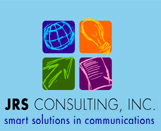


  |
||||
Leader Communication AssessmentHow effective is your communication? To find out, take JRS Consulting’s quick Communication Assessment. Assessment areas are based on our interviews with more than 1,000 leaders and their team members about executive communication. Whether you lead an organization, a team, or an initiative, communication is critical for achieving your goals. However, some executives fail to meet their full potential, not because they lack core competency skills, but because they are missing some communication/management tools. Score yourself from 1 to 4 for each of the statements below. After completing the survey, press the Results button to find your total score and the implications for your organization. Rank each on a scale of 1 to 4
|
 |
|||
© 2008 JRS Consulting, Inc.